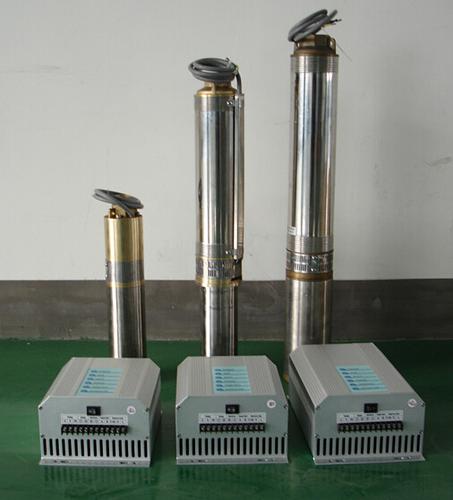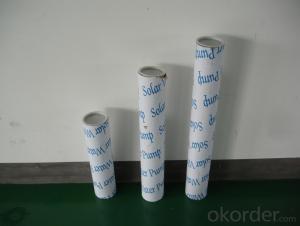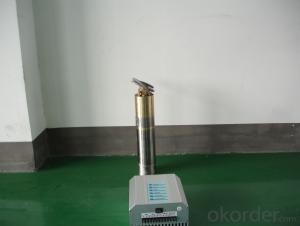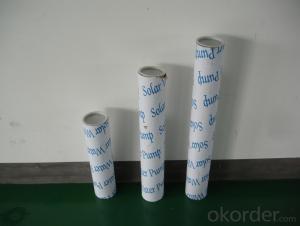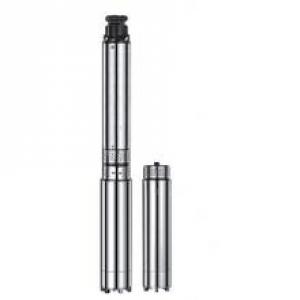Solar Deep Well Pump for A Pond
- Loading Port:
- China Main Port
- Payment Terms:
- TT OR LC
- Min Order Qty:
- -
- Supply Capability:
- -
OKorder Service Pledge
Quality Product, Order Online Tracking, Timely Delivery
OKorder Financial Service
Credit Rating, Credit Services, Credit Purchasing
You Might Also Like
pecifications
solar deep well pump1 sensorless brushless permanent magnet motor
2 water lubricated bearing
3 9 patents
solar deep well pump
Here we provide videos for your further recognization of our pumps
http://www.tudou.com/programs/view/WZTPg24M11s/
http://www.tudou.com/programs/view/xIPzLJwrhUE/
- Q: Can solar pumps be used for swimming pools or ponds?
- Yes, solar pumps can be used for swimming pools or ponds. Solar-powered pumps are an eco-friendly and cost-effective option for circulating and filtering water in outdoor spaces. They harness energy from the sun to power the pump, making them a sustainable choice for maintaining the water quality in swimming pools or ponds.
- Q: Can a solar pump be used for irrigation in orchards?
- Indeed, the utilization of solar pumps for irrigation in orchards is entirely feasible. Not only are these pumps highly efficient, but they are also environmentally friendly, making them an ideal choice for delivering water to crops, including orchards. By harnessing solar energy, these pumps can operate without the need for electricity or fuel. Moreover, solar pumps can be customized to cater to the specific irrigation requirements of orchards, ensuring a consistent water supply during dry periods or precise delivery to the root zone. Additionally, they can be enhanced with sensors and automated systems to optimize irrigation schedules and water consumption. Ultimately, solar pumps offer an economical and sustainable solution for orchard irrigation.
- Q: How does a solar pump help in reducing water wastage?
- A solar pump helps in reducing water wastage by utilizing renewable energy from the sun to pump water instead of relying on conventional electricity. This eliminates the need for fossil fuel-based power sources, reducing carbon emissions and minimizing environmental impact. Additionally, solar pumps often come equipped with smart technology that enables efficient water usage, such as timers, sensors, and automatic shut-off mechanisms, ensuring water is only pumped when needed. This helps prevent unnecessary water wastage and promotes sustainable water management practices.
- Q: Can a solar pump be used in areas with limited access to water desalination systems?
- Yes, a solar pump can be used in areas with limited access to water desalination systems. Solar pumps use photovoltaic panels to convert sunlight into electricity, which can power the pump to extract water from various sources like wells, rivers, or lakes. While water desalination systems are typically used to remove salt and other impurities from seawater, a solar pump can be used to access and transport water from any available source.
- Q: What is the energy efficiency of a solar pump compared to traditional pumps?
- In comparison to traditional pumps, solar pumps generally exhibit higher energy efficiency. By harnessing the energy of the sun, solar pumps eliminate the need for electricity or fuel consumption, rendering them more eco-friendly and cost-effective in the long term. Conversely, traditional pumps often rely on electricity or fossil fuels, which can be costly and contribute to carbon emissions. Furthermore, solar pumps possess the advantage of self-sufficiency and independence from the grid, making them suitable for remote areas or locations with limited access to electricity. Moreover, solar pumps are engineered for optimal efficiency, incorporating advanced technology and intelligent controls that maximize energy usage and minimize wastage. Overall, solar pumps present a more environmentally conscious and efficient alternative to traditional pumps.
- Q: Can solar pumps be used for water supply in remote community or social projects?
- Yes, solar pumps can be used for water supply in remote communities or social projects. Solar pumps are an excellent solution for areas with limited or no access to electricity. They harness energy from the sun to power the pump, eliminating the need for grid electricity or fuel. This makes them cost-effective and sustainable for providing water supply in remote areas. Additionally, solar pumps require minimal maintenance and can be easily installed, making them suitable for social projects aimed at improving water access in underserved communities.
- Q: Is it possible to use a solar pump in areas with high water tables?
- Yes, it is possible to use a solar pump in areas with high water tables. Solar pumps are capable of lifting water from deep underground, including areas with high water tables. These pumps use solar energy to power the motor and pump, eliminating the need for electricity or fossil fuels. They can be an efficient and sustainable solution for accessing water in areas with high water tables.
- Q: Can solar pumps be used for irrigation?
- Yes, solar pumps can certainly be used for irrigation. Solar-powered irrigation systems are increasingly being adopted as a sustainable and cost-effective solution for agricultural water needs. These pumps utilize energy from the sun to power water pumps, allowing farmers to efficiently irrigate their fields without relying on grid electricity or fuel-based generators. Solar pumps offer a reliable and eco-friendly alternative that can effectively meet irrigation requirements in areas with access to sunlight.
- Q: How does the performance of a solar pump vary with different sunlight intensities?
- The performance of a solar pump typically varies with different sunlight intensities. As sunlight intensity increases, the solar pump's performance tends to improve, resulting in higher water flow rates and increased efficiency. Conversely, during periods of lower sunlight intensity, the pump's performance may decrease, leading to reduced water flow rates and lower overall efficiency. Therefore, the sunlight intensity plays a crucial role in determining the performance of a solar pump.
- Q: Can a solar pump work at night?
- No, a solar pump cannot work at night as it relies on solar energy to operate.
Send your message to us
Solar Deep Well Pump for A Pond
- Loading Port:
- China Main Port
- Payment Terms:
- TT OR LC
- Min Order Qty:
- -
- Supply Capability:
- -
OKorder Service Pledge
Quality Product, Order Online Tracking, Timely Delivery
OKorder Financial Service
Credit Rating, Credit Services, Credit Purchasing
Similar products
Hot products
Hot Searches
Related keywords

